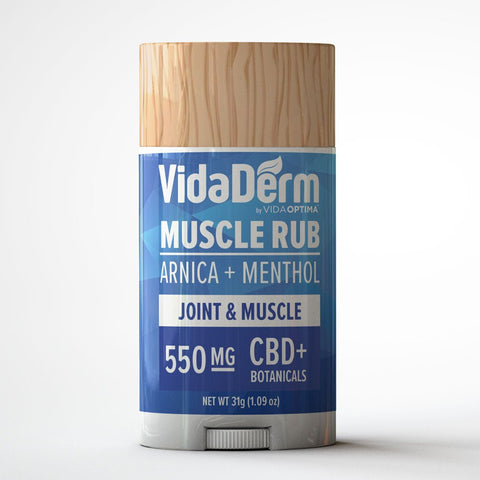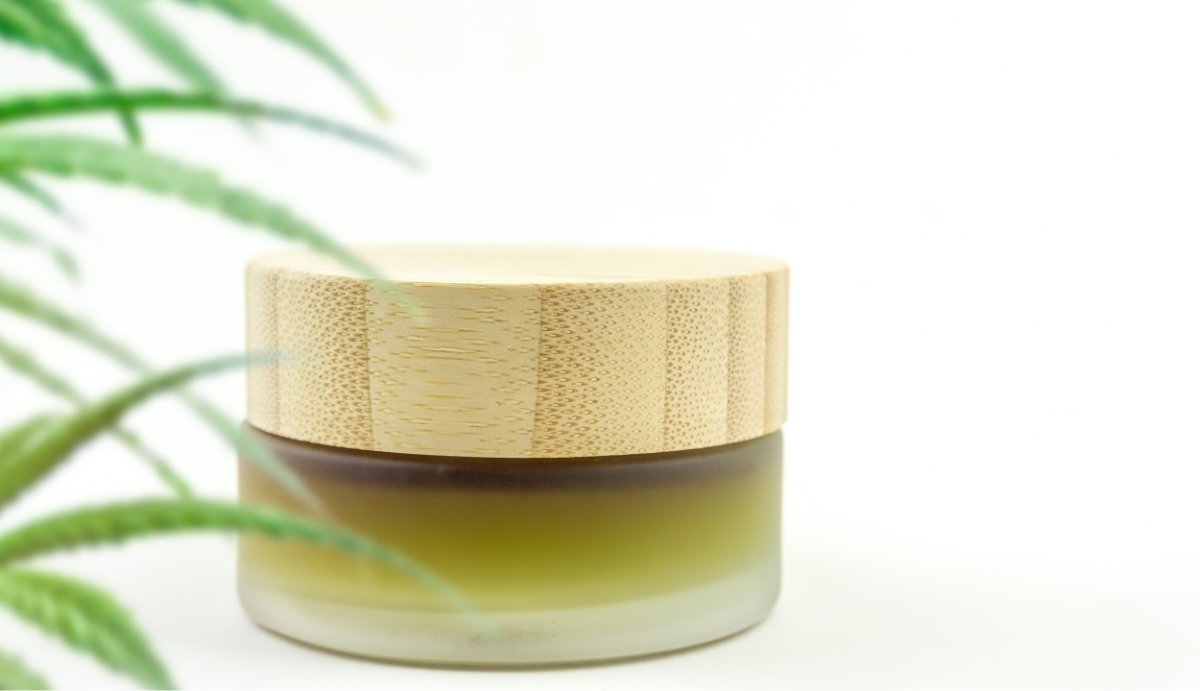Your Cart is Empty
FREE SHIPPING ON ALL ORDERS $75+
CBD topicals are becoming much more commonplace, and you're right to wonder how they interact with your body and a drug test result.
Whether you're considering tossing it in your gym bag for post workout recovery or getting a professional massage with CBD massage oil, you'll find that there are a wide variety of CBD formulas available, each containing a colorful array of different cannabinoids, terpenes, and other plant derived compounds.
The question many consumers arrive at is "Can topical CBD show on a drug test?"
It boils down to this–CBD itself will not cause a failed drug test, but the THC content of some CBD products is much more controversial. However, CBD topicals are not known to penetrate the bloodstream and should have no effect on drug test results.
Here, we’ll explore how CBD topicals work and what you should and shouldn't worry about when it comes to CBD topical drug tests.
Let’s start with the basics:
Table of ContentsCBD, or cannabidiol, is the primary cannabinoid found in hemp, as opposed to THC, the primary cannabinoid found in marijuana. Unlike THC, CBD is non-psychoactive, but it still interacts with the Endocannabinoid System in a meaningful way.
CBD is potentially therapeutic, both when taken by mouth when used topically. As a topical, CBD is widely believed to help reduce inflammation, soothe muscle pain, promote athletic recovery, and address an array of skin concerns. Evidence exists to help support these benefits, which we will discuss in greater detail below.
CBD's ability to offer these therapeutic benefits without causing a head high is its greatest appeal. Still, some people have run into drug testing issues due to the trace amounts of THC found in full spectrum CBD oil products designed to be taken by mouth. Thankfully, this is much less of a worry for CBD topicals because of the way they interact with the body, meaning you may be able to use full spectrum topicals with far less risk.

CBD topicals are exactly as they sound–CBD in topical form. This can mean CBD oil meant to be rubbed on the skin, CBD salves meant to target certain skin conditions, or CBD muscle rubs meant to penetrate deep and help to alleviate pain.
The type of CBD topical that you choose is totally based on preference, but it usually depends on how you intend to use it. All in all, though, they'll each be pretty similar. As a rule, CBD topicals contain a base, usually an oil or butter of some form that's meant to carry CBD and help it absorb into the skin. CBD is fat soluble, so it needs to be carried by an oil in order to effectively penetrate the skin.
Some topical CBD products also contain other hemp derivatives, like other cannabinoids and terpenes, as well as other botanicals, like camphor, menthol, or other essential oils chosen to boost the product's therapeutic effects.
You'll also have multiple formula options to choose from, but there are three basic options. Let's break them down:
Full Spectrum refers to a CBD formula that contains a wide array of the cannabinoids found in cannabis, including trace amounts of THC, but also usually CBN, CBG, CBC, and more.
Broad Spectrum CBD products typically contain a large concentration of CBD alongside other trace cannabinoids, but they do not contain THC.
CBD Isolate simply refers to a formula that contains only isolated CBD molecules. It will not contain any other cannabinoids, though some CBD isolate products do have added terpenes and botanicals.
The difference in these two formulas is up for debate, but many people believe that Full Spectrum CBD formulas are more effective for most therapeutic purposes because they provide the added benefit of the entourage effect, a phenomenon where hemp cannabinoids work synergistically to boost each other's effects. This of course is why CBD drug testing comes into question. Full Spectrum products contain at least trace amounts of Delta-9-THC, an illicit cannabinoid that will register on a drug test report.
Luckily, you probably don't need to be concerned about the THC in topical CBD products. Here's why:
CBD, like other cannabinoids, interacts with the Endocannabinoid System, a regulatory system responsible for carrying out crucial bodily processes. The Endocannabinoid System wears lots of hats, but the most significant to CBD topicals is its ability to regulate pain signaling and the inflammatory response.
Research shows that CBD may help to reduce inflammation and pain across several applications, and CBD topicals do this by penetrating the deeper layers of the skin and interacting with CB2 receptors in the tissues below the surface.
In other words, CBD may penetrate all layers of the skin, all the way down to joints and ligaments, but it does not need to crossover into the vascular system to reach the Endocannabinoid System. That means that CBD (or THC) that's applied topically doesn't reach the bloodstream or have any systemic effect on the body.
First and foremost, it's important to note that drug tests don't test for CBD. The risk of failing a drug test after using CBD involves only the trace amount of THC in Full Spectrum CBD products. The risk is already very small (and there's no THC risks associated with Broad Spectrum or CBD Isolate).
Evidence suggests that THC, when applied topically to the skin, also doesn't reach the bloodstream. That brings the already small risk down to zero. That means you should be safe to use full spectrum CBD topicals, even if you're subject to drug testing.
Will CBD massage oil show up on a drug test?
No, CBD massage oil is unlikely to show up on a drug test because it is applied topically and does not enter the bloodstream in significant amounts.
We lightly touched on how topicals work and the benefits that topicals may provide, but let’s dig deeper into the research available to support the use of topical CBD for inflammation and pain.
As we noted above, CBD can penetrate deep into the skin to interact with CB2 receptors, where it may have an impact on the body’s pain and inflammation response. According to the American Academy of Dermatology Association (AAD), CBD may be useful for managing certain inflammatory skin conditions, like acne, psoriasis, and eczema.
Research has also found that its anti-inflammatory effects may help to provide pain relief when used topically. One 2016 study, for instance, found that CBD, when applied topically to mice, may have long lasting benefits for reducing inflammation and pain-related behaviors caused by arthritis.
Furthermore, CBD may be useful for managing certain pain conditions that are difficult to treat. A 2020 study found that topical CBD oil may help to reduce pain related to neuropathy, a condition characterized by nerve damage that causes numbness and weakness in the hands and feet.
More research is needed to understand the full potential of CBD topicals for managing different types of pain and discomfort, and to compare the benefits of full spectrum and CBD isolate formulas. For now, we know that CBD topicals potentially offer a wide range of benefits with very little risk, so they may be worth a shot for anyone looking to manage topical skin conditions or muscle pains.
We briefly covered the different types of CBD topical formulas above, but let’s touch on the two most common product types you’ll find in today’s hemp market–salves and muscle rubs.

A salve is a thick, buttery application that offers moisturizing properties. When infused with CBD, as well as other cannabinoids and botanicals, it can potentially be used to address topical skin concerns, like redness, irritation, itching, wounds, dry skin, blemishes, and more. Most skin soothing salves won’t contain menthol or other ingredients that will potentially irritate a rash or blemish, so this is the best option for skin care purposes.
Our CBD Skin Balm is designed to soothe topical scrapes, cuts, burns, and more. The functional formula combines nourishing rosehip oil and shea nut butter with rejuvenating essential oils to help support optimal skin health and healing.

Muscle creams, on the other hand, can come in many forms. These may be creams, lotions, roll-ons, or a solid stick that can be applied to a targeted location. Usually, these will contain a higher potency of CBD alongside fast-acting botanicals, like camphor, menthol, and other plant-based analgesics.
Our CBD Muscle Rub, for instance, combines a potent CBD extract with hand selected botanicals, including cooling menthol, soothing arnica, and a powerful dose of turmeric oil. The combination is designed to support blood flow, lower inflammation, and offer a synergy that helps to calm pain and discomfort in the joints and muscles.
Although CBD has not yet been approved by the FDA as a topical treatment for any condition, many people are eager to give it a shot for managing arthritis. Luckily, because it’s derived from hemp, it’s much more accessible than other cannabis products. In fact, you can order federally legal hemp products online and have them shipped right to your door from almost anywhere in the country.
There’s one drawback–the hemp industry is still poorly regulated, so you’ll need to take care to choose a high-quality, well-formulated CBD cream. At Vida Optima, we follow the same stringent quality standards for all of our CBD products, whether they are meant to be ingested or applied topically.
Our VidaDerm CBD Skin Care line is carefully formulated with premium CBD extract, hand chosen botanicals, and nourishing plant oils to offer a gentle and effective option for combating skin concerns at the surface and aches and pains deep in the joints. Pair it with a systemic CBD dose from our Vitality Collection for a full-coverage CBD wellness routine.
Topical CBD generally does not enter the bloodstream in significant amounts, so it is unlikely to stay in your system or show up on drug tests. The effects of topical CBD are localized to the area where it is applied and do not usually lead to systemic absorption.
CBD oil typically does not affect routine blood work. Standard blood tests do not screen for CBD, and it should not interfere with common blood parameters. However, always inform your healthcare provider of any supplements you are taking.
CBD itself is not commonly tested for in hair follicle drug tests. These tests are usually designed to detect THC and other controlled substances. However, if the CBD product contains trace amounts of THC, there is a potential for THC to show up in a hair follicle test.
To expedite the elimination of Delta-9-THC from your system, stay hydrated, maintain a healthy diet, and engage in regular exercise to boost metabolism. THC is stored in fat cells, so increasing your metabolic rate can help speed up the process. Additionally, avoid consuming more THC to prevent extending the detox period.
Hair follicle tests can detect drug use for up to 90 days or longer, depending on the length of the hair sample. The test measures drug metabolites embedded in the hair shaft, providing a long detection window for substances used within the past three months.
1. "Public, researchers demonstrate growing interest in cannabis treatment" https://www.aad.org/news/topical-cannabis
2. "Transdermal cannabidiol reduces inflammation and pain-related behaviours in a rat model of arthritis" https://www.ncbi.nlm.nih.gov/pmc/articles/PMC4851925/
3. "The Effectiveness of Topical Cannabidiol Oil in Symptomatic Relief of Peripheral Neuropathy of the Lower Extremities" https://pubmed.ncbi.nlm.nih.gov/31793418/
Comments will be approved before showing up.



